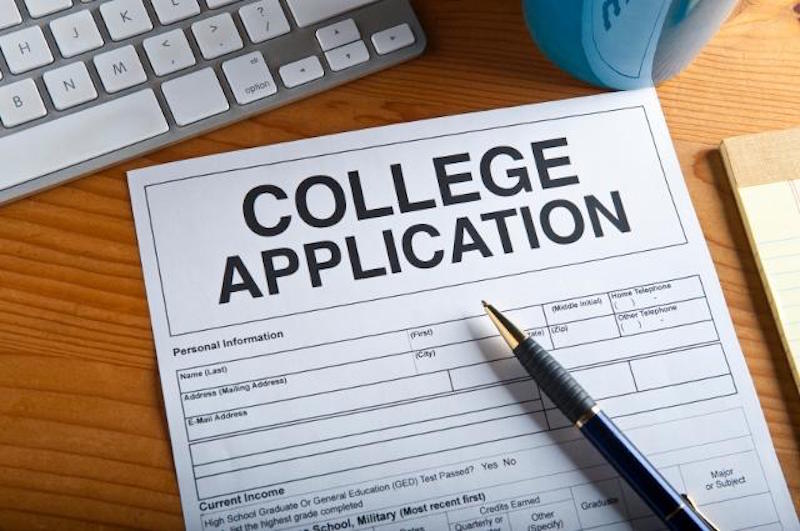Seniors On the Common App
Seniors guide through what it was like to apply through the common application
The college application process can seem like a daunting task. For students without any siblings or parents who are familiar with the process, it can be even more intimidating. A good way to stay ahead is by getting started on a to-do list during junior year, which allows students to have time to obtain their letters of recommendation, write out personal essays, and get a general idea of everything that needs to be done by the deadline.
“Students don’t start early enough and so they don’t realize how much work is involved in the whole college application process,” said Ms. Kapadia, the school guidance counselor. “It’s this long process and that’s involved with lots of little things that add up to the big things, so it is important to start early.”
The Common Application is accepted by more than 900 colleges and universities which also allows you to apply to schools located outside the U.S. The Common Application helps streamline the essential part of the admissions process for students. As part of the application process, most colleges require that you submit a personal statement, letters of recommendation, personal information, and high school transcripts.
Seniors have a variety of deadlines they can choose from when applying to colleges. Most offer four different types of application deadlines and it is important to understand what each one means and whether it applies to you or not.
Regular decision deadlines are the most common type of deadline for colleges. When applying through regular decision there is no limit to the number of schools you can apply to. If more than one college accepts you, then you are under no obligation to enroll in that particular college.
Senior Indra Mungunsuh is hoping to seek a major in art and graduate with an illustration degree.
“To be honest, I missed the deadline for the early action, so I had to apply regular decision,” Mungunsuh said.
Mungunsuh’s ideal college is something that is affordable and fits within her area of interest, which is why she is narrowing down her list of colleges that are near the metropolitan area. The regular decision allows plenty of time to complete your application and apply to many schools that you find suitable. However, there are downsides. If you end up fully relying on regular deadlines it can become a lot to tackle during the final months of senior year in the context of also applying to scholarships, finals, and other responsibilities that come with the final stretch.
Early decision deadlines allow students to apply early to their intended college which allows for the school to review and respond earlier to the application. If the college accepts you, you are obligated to attend that college and cannot break your contract, which means you can only apply to one school in this form.
This is the ideal option for students who have their hearts set on one particular college. However, if you are unsure about this college or if you have any hesitations at all, an early decision is not recommended. The downside to an early decision is the binding contract which comes at a huge fee if you try to cancel and your application is due a lot earlier.
Yanson Khuu applied early decision to the University of Virginia (UVA) because he is interested in a high-ranking school that specializes in engineering and computer science. “I am a 529 child, so, I am trying to stay in state because the plan covers most in-state tuition,” Khuu said. “UVA fits my bill pretty solidly as I don’t mind a crowded school if it has what I’m looking for.”
529 is a college saving plan that enables you to save money for a beneficiary and pay for educational expenses. It is legally known as “qualified tuition plans”, they’re sponsored by states, state agencies, or educational institutions authorized by section 529 of the Internal Revenue Code.
Applying early decision shows the school that you are committed to attending since it is your first choice. As a result, you get a faster response, so even if you are declined you still have plenty of time to apply to other schools.
On the other hand, early action deadlines allow you to send in your college application early], but with a huge difference in that, it is not binding. You are allowed to apply to multiple colleges, thus, expect an early response from all the colleges that you apply to. With early action, you can apply to multiple colleges and choose anyone from among those that have accepted you in their program.
Semira Lewis applied early action to Virginia Commonwealth University (VCU) because she is looking to pursue a degree in forensic science.
“I like VCU because it’s in Richmond, and I have family and friends here which makes the transition a whole lot easier,” Lewis said. She hopes to get a response back as soon as possible since this is one of her top schools and if she does not get accepted into the program, she will have ample time to consider other schools nearby.
Rolling admission deadlines are similar to regular decision deadlines; the only difference is that colleges will not wait until the deadline to start considering applications. The colleges start evaluating the applications as they come in and send out the letters as soon as they reach a decision. It is always a good idea to apply early for rolling admissions. Not all colleges have rolling admissions, but for the ones that do offer it, turning it in later could hurt admission chances.
Not one student is the same and if you feel like your application is not ready to submit by the early deadline, then hold off until the regular admissions deadline. However, if you feel that applying early is the best option then taking that leap allows you to be rid of the stress of college applications much sooner. You alone can decide which application works best for you by ensuring your utmost confidence when submitting applications.
Khuu did not have any struggles while applying through the Common Application. “I’ve had three older sisters who have already applied to college so I’m not completely new to this,” Khuu said. “They helped me out with my application so I knew quite a lot beforehand.”
On the other hand, first-generation college students like Mungunsuh, do not have the comfort of relying on their family members for support when applying to college for the first time. She struggled to apply to art schools because she was on her own.
“I watched YouTube videos and it sort of just told me step-by-step how to fill out the application,” Mungunsuh said.
A resource available for students struggling with applications is the Saturday Academy days, which offer extra help opportunities from 9:00 a.m. to 1:00 p.m. Students can drop by for however long they feel they need help for and teachers provide support with subjects students are struggling in or college application questions with a counselor.
There is no question that applying to colleges is stressful. Thinking about which colleges to apply to, when to write applications and essays and the thought of whether they will be accepted or rejected can take a toll. While all of this is occurring, students are juggling senior year and the stress that comes with it.
“I think students [don’t realize] just how much is involved in the [application] process is often what is the most confusing part.” Ms. Kapadia said. “However, the hardest part for a lot of students is picking a list of colleges that are the right fit for them. Everyone’s talking about colleges that they know someone has gone to, but you have to realize that you have to find the school that is right for you.”










